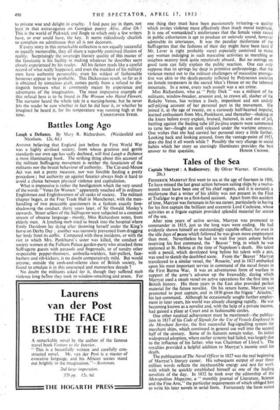Battles Long Ago
ANYONE believing that England just before the First World War was a highly civilised society, from whose gracious and gentle standards our own age has sadly declined, will find Laugh a Defiance a most illuminating book. The striking thing about this account of the militant Suffragette movement is neither the fanaticism of the militants nor the brutal behaviour of authority. The Cat-and-Mouse Act was not a pretty measure, nor was forcible feeding a pretty procedure ; but authority up against fanatics always finds it hard to avoid a choice between physical violence and capitulation.
What is impressive is rather the hooliganism which the very sound of the words "Votes for Women" apparently touched off in ordinary Englishmen and Englishwomen of all ranks of society. The militant Chapter began, at the Free Trade Hall in Manchester, with the man- handling of two peaczable questioners in a fashion exactly fore- shadowing the conduct, thirty years later, of Sir Oswald Mosley's stewards. Street sellers of the Suffragette were subjected to a constant stream of obscene language—mostly, Miss Richardson notes, from elderly men. A lynching mob tried to break into the hospital where Emily Davidson lay dying after throwing herself under the King's horse on Derby Day ; another was narrowly prevented from dragging her body from its coffin. Compared with these incidents, or with the riot in which Mrs. Pankhurst's sister was killed, the conduct of society women at the Fulham Palace garden-party who attacked three Suffragette guests with parasols and fingernails, or of sundry other respectable pepper-throwers, umbrella-wielders, hair-pullers, face- bashers and rib-kickers, is no doubt comparatively mild. But would anyone, outside the cosh-and-stiletto class of British society, be found to emulate it in this coarsened and mannerless decade ?
No doubt the militants asked for it, though they suffered mob violence long before they took to window-smashing and arson. For one thing they must have been passionately irritating—a quality which invites violence more effectively than much moral turpitude. It is one of womankind's misfortunes that the female voice raised in public exhortation is apt to produce an unlovely sound, however admirable its utterances. It was the peculiar misfortune of the Suffragettes that the fashions of their day might have been (and if Mr. Laver is right probably were) especially contrived to make any woman indulging in such masculine activities as marching or soapbox oratory look quite repulsively absurd. But no outrage on good taste can fully explain the public reaction. One can only suppose that its springs lay deep in primitive anthropology, that the violence meted out to the militant challengers of masculine preroga- tive was akin to the death-penalty inflicted by Polynesian societies on female yespassers in the sacred Men's House or on the tabooed mountain. In a sense, every such assault was a sex crime.
Miss Richardson, who as " Polly Dick " was a militant of the militants, window-breaker, arsonist and, to crown all, slasher of the Rokeby Venus, has written a lively, impenitent and not unduly self-pitying account of her personal part in the movement. She joined it, at the age of twenty, on a curiously half-hearted impulse; learned enthusiasm from Mrs.Pankhurst, and thereafter—shaking at the knees before every exploit, bruised, battered, in and out of jail, battling against the feeding tube till jiu-jitsu experts were summoned to tame her—fought on until released under the wartime amnesty. -One wishes that she had carried her personal story a little further. Looking back and looking around, from the vantage-point of 1953, does she find it all worth while ? Possibly the very change in social habits which her story so startingly illuminates provides the best


































 Previous page
Previous page